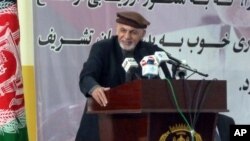Afghan President Ashraf Ghani on Tuesday swore in 16 new members of his Cabinet whose nominations were endorsed by the parliament last week.
The so-called national unity government now has nearly a complete Cabinet, barring the defense minister, seven months into its term.
The political advancement has raised hopes of improvement in governance and better management of security and economic troubles facing Afghanistan.
The swearing in ceremony at Kabul’s presidential palace followed Saturday’s mandatory parliamentary endorsement of all new cabinet members, including four women.
The swift approval by the parliament surprised many because the first such vote of confidence in late January, saw lawmakers approving only a third of the ministers Ghani nominated to form a 25-member cabinet. Dual nationality, allegations of involvement in crimes and lack of higher education were cited among the causes.
But insurgent attacks around the country have increased and economic troubles have deepened in the wake of international military withdrawal and dwindling financial assistance.
Kabul-based political analyst Haroun Mir says that Afghans were growing tired of not having an effective government, adding that might have pressured lawmakers into giving a “blanket vote of confidence” to the latest ministerial nominations.
“I think that was the pressure because people were saying we need the government to function," Mir said. "That certainly shows that the MPs [members of parliament] don’t want to take responsibility for it. Now, the responsibility is with the government. So, the Cabinet is fully approved and there is no other excuse or argument left for the government to say why things are not picking [up] speed and why things are moving very slowly in the country.”
Forming the Cabinet has been a critical challenge for Ghani since he took office in September when Afghanistan completed its divisive electoral process.
The protracted presidential vote saw Ghani’s election rival, Abdullah Abdullah, becoming the country’s chief executive. Afghan media and critics have frequently cited differences between the two leaders for the delay in cabinet nominations and on other national issues.
Disagreements between Ghani and Abdullah are being blamed for the government being unable to appoint a defense minister at a time when traditional spring fighting season is about to start and Taliban insurgents have stepped up attacks across Afghanistan.
Afghan security forces are bracing for the fighting season without direct foreign military assistance in the decade-long conflict with commanders citing lack of preparedness for recent battlefield setbacks.
Ghani and Abdullah have denied allegations of differences between them. The Afghan president attempted to dismiss the criticism again on Tuesday when he circulated a picture with his chief executive in a Twitter post.
The caption says “taking a stroll with my colleague, Dr. Abdullah, after the swearing in ceremony of the 16 new members of the Cabinet.”
Stronger Protection of Civilians
Also on Tuesday, a top United Nations official again urged Afghan officials to ensure stronger protection of civilians.
U.N. Assistant Secretary-General for Human Rights Ivon Simonovic, made the remarks in a statement issued at the end of his week-long mission to the violence-hit country.
Afghanistan finds itself in a paradoxical situation, he said.
“On the one hand, there are new opportunities for peace talks that would have been unimaginable only a few months ago," Simonovic said. "On the other, the conflict looks set to intensify as insurgents test the strength of the security forces hoping to gain leverage in future negotiations.”
Simonovic said that attacks of the past week have demonstrated it will be Afghan civilians who pay the price, emphasizing the need for doing more to protect them.
The U.N. Assistance Mission in Afghanistan has reported eight percent increase in civilian casualties in ground battles in the first quarter of 2015.
According to preliminary figures it has released, 655 civilians have already been killed and 1,155 injured so far this year.




